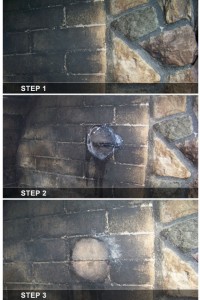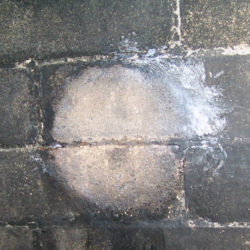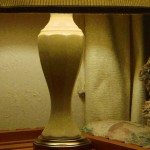 Did you just purchase a new home, or move into a new rental property? Are you getting your current house ready prior to moving out? Are you working to replace a traditional wood burning fireplace with a gas fed unit? Have you neglected the interior surface of your fireplace for a number of years? If you answered yes to any of these questions, then chances are that you are currently struggling with the thick black build up inside your fireplace, and you either don’t know what to use, or you have already given up because you don’t think it is possible to get it clean. It may be hard to believe, but despite how yucky or impossible it looks in there, you will be able to clean the inside, and restore it to a more new looking state. For traditional methods that are commonly used on a job like this, or for more general info on cleaning the different surfaces you will encounter, read our other tip: cleaning soot from brick or stone. The tip that follows below will delve deeper into what it takes to get the interior super clean without hiring someone else to do it, or resorting to toxic substances.
Did you just purchase a new home, or move into a new rental property? Are you getting your current house ready prior to moving out? Are you working to replace a traditional wood burning fireplace with a gas fed unit? Have you neglected the interior surface of your fireplace for a number of years? If you answered yes to any of these questions, then chances are that you are currently struggling with the thick black build up inside your fireplace, and you either don’t know what to use, or you have already given up because you don’t think it is possible to get it clean. It may be hard to believe, but despite how yucky or impossible it looks in there, you will be able to clean the inside, and restore it to a more new looking state. For traditional methods that are commonly used on a job like this, or for more general info on cleaning the different surfaces you will encounter, read our other tip: cleaning soot from brick or stone. The tip that follows below will delve deeper into what it takes to get the interior super clean without hiring someone else to do it, or resorting to toxic substances.
Chances are, your fireplace does not look as bad as the one pictured. In the example we will be using, the light colored brick has been turned completely black by layers of soot, ash and creosote. Most people would think that it would have to stay that way, but with just a single attempt, we were able to remove about 97% of the build up in the small circle that was cleaned. A second application would have gotten it even cleaner, but for illustrative purposes, we wanted you to see what a single application, and minimal effort could accomplish. The circle of brick we washed is no longer black in color because there is no longer anything coating it. What you see is the color that the bricks used to be when they were new, and that was probably 40 or more years ago. Continue reading below to find out how we did it, and how easy it will be for you to duplicate the results in your own fireplace.
WHY CLEAN IT?
You would never want to install a gas burning unit in a used and filthy area because when it burns, it is a much cleaner process. If you are retrofitting an existing installation to switch it from wood to gas, then cleaning the inside first is highly recommended, and most would consider it mandatory. Once clean, and the new unit is installed, it will never get as dirty again, and you will be able to keep looking good because natural gas is much cleaner than firing up some logs. Even the most lazy folks out there would agree that the effort would be well worth it in this case. Another reason to scrub the inside of your fireplace would be if you are moving. When trying to sell a house, and old looking focal point, covered in black grime can really make your living room look bad. When moving in somewhere new, many of us will prefer to clean out the layers of dirt left behind by previous occupants, and this is one area of a home that gets significant use, and that results in layers of dirt. Because not everyone will leave a home in top shape, a job like this may be something you want to complete prior to moving in. A significant number of people like to keep their fireplace looking good at all times, no matter which type it is. If you regularly operate a wood burning unit, then a once a year spring cleaning can keep it in good shape for the rest of the year. Simply take the time to remove last winter’s layers of soot,and you will have a pristine surface to look at all summer long, and it will never become too big of a chore.
WHAT MAKES IT SO DIRTY?
Most fireplaces will have some loose debris and topical dirt to worry about, but the reason you are reading this article is due to that impossible looking residue that a burning fire creates. Fire is not clean. If you use burning wood to heat your home, you will eventually have to clean the inside, or deal with the not so nice appearance. As smoke travels upward to your chimney it fully engulfs the inside of your fireplace. Over time this results in soot, ash, creosote and smoke residue that sticks to bricks and stone, and appears to be impossible to clean. This residue can be sticky or chalky, and it is always dark black in coloration. It will cover bricks and grout, and will even sneak into small pores in natural stones. The staining is organic in nature because it is mostly carbon that has been deposited from the burning wood. It is certainly unsightly to look at, but rest assured that the surface is not permanently damaged or discolored, it is simply coated with one of the more difficult things to clean.
Most traditional cleaners will not even make a difference on this type of dirt, and the ones that do work a little bit will usually just cause you to smear stuff around and make a bigger mess. If you ask the so called experts, they will tell you that it will never come off unless you use some expensive chemical that is super dangerous, or something else that includes acid. If you like wearing a mask and gloves, then go with one of those options, and hope for the best. If you prefer a safe and effective option, continue reading. Other people may encourage messy options like pressure washers, but who wants to blast soot out of the interior of your fire place, only to have it end up on carpeting or walls. The ideal approach is to use an effective method that allows you to lift the layers of residue, and completely remove them in a simple and efficient manner that does not risk the surface being cleaned, or the stuff surrounding it.
HOW TO CLEAN IT
Quick N Brite is a powerful, all natural cleaner that works on hundreds of jobs, and this is one it is really good at. Most people are amazed at how well it removes soot , and brings brick and stone back to life. It does not burn it away, bleach it out of existence, or blast fry it off the surface, and you will not need to scrub for hours to get things clean. It’s specialty is lifting organic stains, and although the black color makes it look scary, that is all that we are talking about here. It is one of the tougher organic stains out there, but it is easily removable when you are using the right tools. It is so safe that you can use it on any surface, let it touch your skin, use it where kids play and so much more. You run no risk of harming any part of your fireplace, and in a few easy steps you can end up with outstanding results. It has no harsh smell, it does not burn your eyes with exposure, and it is not toxic in any way. In fact, it is totally biodegradable and safe for the environment. Get this powerful cleaner to dominate this job, and then break it out for any other cleaning job that seems impossible. This stuff works incredibly well, and you can use the leftovers to remove stains from clothing, get rid of soap scum in the bathroom, take grease off of kitchen cabinets, eliminate oils stains on your driveway and so much more.
STEP BY STEP INSTRUCTIONS:
Take a look at the picture above. It clearly shows how the brick was completely black from years and years of use without cleaning, and then after a single application, it was restored to it’s original color. We used a combination of liquid and paste, but you could get the same results with paste alone, it might just take a bit more effort. To clean the inside of your fireplace, simply follow the steps below, and when finished, you will be able to admire your impressive outcome.
- Prepare to clean. You will need some Quick N Brite Paste. In the example above, we also used a quart spray bottle with 3-4 Tbsp. of the liquid mixed into water to create an all purpose spray. You can get away with using just water to prep the area, but using a heavy spray solution of Quick N Brite will just make the job easier. You will also need a nylon brush or something else that is scrubby in nature. We used a brush, but a scrub pad or 0000 steel wool and other similar tools would work fine also. If you are worried about areas that surround your fireplace, and do not want them to get wet or dirty, then laying out some Super Shammys can give you piece of mind. They will absorb any moisture and dirtiness that comes in contact with them, and this will prevent clean surfaces from getting dirty. You could also lay out plastic or something, but plastic is not absorbent, so liquid will travel, and it will be a bit more difficult to ensure that you are not spreading your mess. The last thing you will need is several cotton rags or old terry cloth towels to remove the cleaner and all of the grime.
- Once you have your cleaner, and the area is prepped, it is time to get cleaning. To make the job easier, you may want to do one section at a time. If you start with one wall, and then move to the next once it is finished, then you will make less of a mess, and run into fewer problems. To begin cleaning, take your heavy solution and spray it all over. You want it to completely cover all areas that are dirty. You can also use plain water for this part, but if doing so, warm or hot water will help you out.
- After you get the area sprayed down, let it sit for about 10 minutes.
- Once it sits, take your brush or other scrub tool and pick up some of the paste. Use the brush to work the paste onto the surface sort of like you are waxing a car. Use circular motions to apply a thin coating all over. When choosing a scrub tool, make sure it will penetrate the residue, but not harm the surface. You do not really need to scrub so much as you need to work it in.
- Once the paste is on, and covering all of the brick or stone, let it sit again for 30-60 minutes.
- After sitting, take one of your towels and begin to wipe the area clean. You will see that the black stuff immediately transfers from the brick to your towel. A white towel will turn completely black as you wipe and clean, and you will probably go through several if doing the whole area.
- A dry towel will work best to remove most of the cleaner and soot, but you may want to use a damp one to get the last little bit off.
- If some cleaner remains in cracks and crevices, using the brush again, or using it wet can help loosen it up, and work it out.
- After a single application, you should get results like you see in the picture, but in some cases, a reapplication may be necessary to complete the job.
THINGS TO THINK ABOUT
Quick n Brite works by removing layers, so if the build up is really thick, or extra stubborn, it may take two applications to make it look like new. If you end up getting the area too wet it will make the process a little extra messy, but this is where the shammies come in. If you set them down first, you can avoid any situation that might be caused by excess moisture. If this was an outdoor fireplace, or a cabin, or even exterior brick, you could save time and effort by using the hose down method. Hose the whole area down, add cleaner and let sit, hose the whole area down again. When working inside your home, you need to be a bit more careful, and using the above steps will allow you to eliminate the soot without getting it everywhere. Most fireplace interiors are constructed from brick, but this material is not exclusive. If yours is made from any other material, you can use the same technique, and you can expect the same results. This cleaner will never harm the surface you are cleaning, and it would be completely safe to apply to any material you might encounter when completing this job.
Stop feeling self conscious about your dirty fireplace. Get it clean inside and out with this remarkable product. If you have family coming to stay, or if it is just that time of year again, try this technique, and you won’t be disappointed. Because it works so well, we can actually guarantee results for a job like this. If you try it out, and follow the steps above, it will absolutely work, and give you results similar to what is pictured. We sell every container with a 100% satisfaction guarantee from us, and and additional money back guarantee from the manufacturer The only way we are able to do this is because it actually works, and it is easy enough for anyone to use. Add to that how safe and versatile it is, and you have a pretty easy decision to make. Get it to eliminate that black stuff on your bricks, and then keep it around to discover all of the other impossible jobs it can tackle.





 Ordering Info
Ordering Info Customer Service
Customer Service Follow Us
Follow Us Search For Stuff
Search For Stuff Find Us
Find Us Call Us
Call Us Pay Us
Pay Us

These are great tips to keep your fireplace clean. You have to remember the places you can’t reach though! It is important to keep your fireplace clean so you don’t start an unwanted fire!
Very true. More than just for appearances, it’s important to keep your fireplace clean for safety reasons too. Thanks for the comment!
Thanks for the tips! I haven’t put much thought into cleaning out my chimney ever since I moved into my new house. I’ve just started thinking about having it cleaned a few days ago when a bird tried to come down my chimney. There was a remarkable amount of soot that came out of it once the bird came through and into my living room. It made a really big mess, so perhaps I should hire a chimney sweep right away.
Thanks for the information! I’ve just moved into a new home that has a fireplace. I don’t have any experience cleaning out fireplaces, so this information will help me know the best way to keep it clean. It’s good to know that there are commercial cleaners that I can use for cleaning fireplaces. Are all commercial cleaners safe enough to let it touch my skin and use it around my kids? It would be nice to know what other cleaners that I can use that are safe to use.
Actually, most cleaners specific to this task are pretty dangerous, and should not be touched with bare hands. You definitely don’t want your kids playing with it, that’s for sure.
I didn’t know that you should prep a fireplace to be cleaned, or that you could prep the area around it for the mess that might be made. Definitely seems like a good idea, especially if the fireplace is particularly messy. Better to clean the mess than spread it.
Yes. Proper set up will not only improve results, it will also make the clean-up process much easier when you finish.
I liked what you said about how it would be smart to brush any cracks when you are cleaning a chimney. It seems like a good thing to get a professional to help with. After all, it seems like a very difficult thing to do when you don’t have the right equipment.
I liked that you explained that it would be smart to let your cleaning solution sit for a while. That is great for me to understand because I want to clean out my fireplace before the start of November this year. It might be best for me to hire an expert to help with cleaning my fireplace.
Have just ordered Quick N Bright. Some wood fell out of the fire onto the heart and has left a nasty stain which I cannot remove. Will Quick N Bright make a difference.
Look forward to your advice.
Yours sincerely
Kathleen Harrison
Yes. It should work well for this job.
Awesome actionable tips. I appreciate the knowledge you are providing for your readers. With 25 years in the industry, I can say that this is extremely helpful